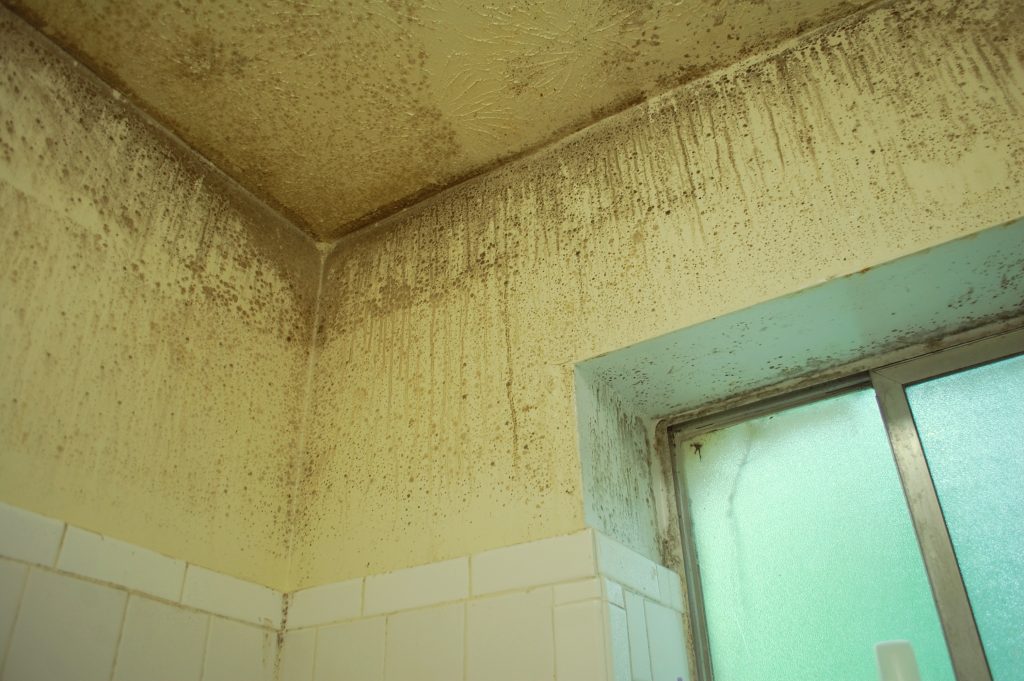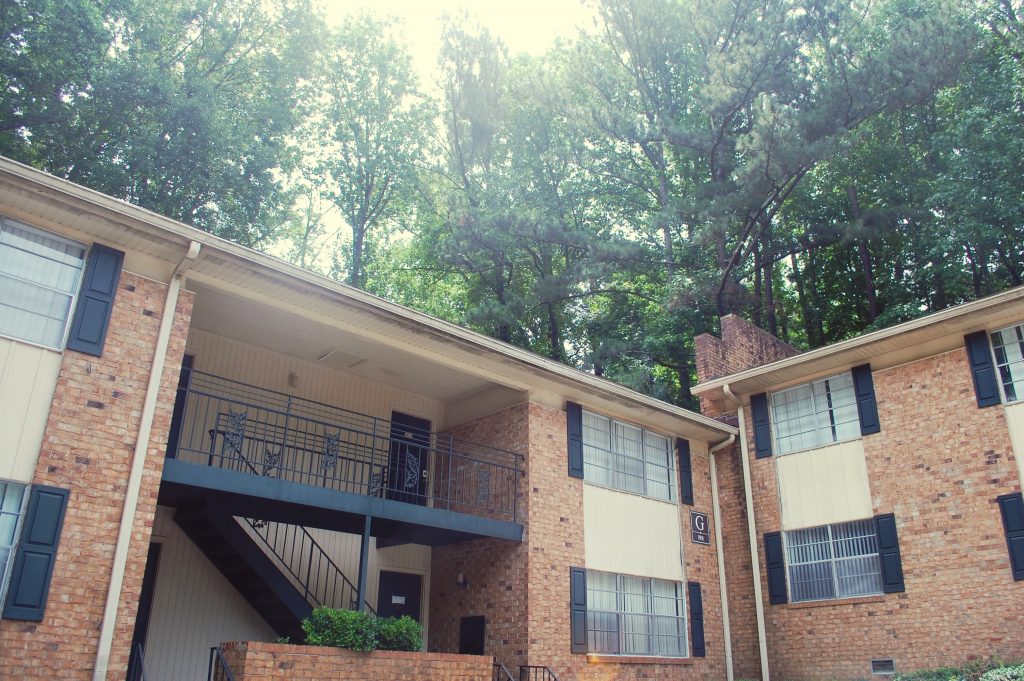Pandemic Leaves Atlanta Tenants Stuck In Deteriorating Units

Laquetta Moore said the conditions in her apartment off Campbellton Road in Southwest Atlanta are unsafe for her family. She deals with mold and the smell of sewage all day.
Stephannie Stokes / WABE
Laquetta Moore describes herself as a person who avoids drama. She said she’s been social distancing for 30-something years. But the problems in her apartment recently have made her desperate.
She starts in her bathroom and waves her hands around the shower walls and ceiling. They’re dripping with black and brown spots.
“It’s black mold,” Moore said. “Mildew.”
She said she and her family scrub the walls with bleach and dish soap. The spots return within a week.
Then Moore moves onto the next problem. Out on the porch, she points out vents in the foundation of her building. She said, when the people living upstairs use the bathroom, the sewage goes into that crawl space.
“It just sits there,” Moore said.
She said her family deals with that smell all day long. The whole building does. She yells over to her neighbors outside, “do you be smelling sewer in your apartment too?” They all yell back, “yeah.”
She lives in a 30-acre apartment complex called Cascade Glen, off Campbellton Road in southwest Atlanta. It’s owned by a New York-based company called CPInvestors.

Moore said she waited for local management to make repairs for over a year. The fixes didn’t happen. With the coronavirus outbreak, she said the office has stopped responding.
Finally she decided to call code enforcement, the city department that’s supposed to ensure units are livable. It was her last-ditch effort.
But a month after her call, she still hadn’t received a response.
“No call, no call. I ain’t heard from them either. Don’t nobody seem to care,” she said.
Substandard housing conditions are not a new problem in Atlanta, housing advocates said. But with the pandemic, tenants like Moore are finding they have even fewer tools to improve their living situations than usual.
Much of code enforcement, which the Atlanta Police Department oversees, has been on hold.
In a presentation to the Atlanta City Council last month, Major Rick Mason said officers are checking out problems they can see from outside–like vacant, burned-out buildings–but not ones that require them to go inside.
“At this time, we are not conducting interior inspections,” he said.
“You’d think now would be the time to invest because people are spending more time in their homes. And so those homes need to be safe.”
Michael Waller, who leads a legal nonprofit that focuses on healthy housing
If the problem sounds serious, Mason said officers are just contacting landlords to fix it. APD did not respond to requests to further elaborate on this approach.
If repairs are up to landlords, attorney Jeff Nix wouldn’t recommend anyone hold their breath. He’s represented tenants in some terrible conditions for the Atlanta Volunteer Lawyers Foundation.
“Rat infested, roach infested, bed bug infested,” he said, describing what he’d seen in units. “Mold, which was causing asthma for all the young children.”
While Nix has mostly worked around English Avenue in Northwest Atlanta, he recognized that unlivable housing can be widespread in the city.
He said he imagines with the coronavirus it’s even harder to get negligent landlords to do maintenance.
“They really weren’t doing any upkeep before the pandemic,” Nix said. “But now you can rest assured if there was any upkeep that was being done, it’s suspended.”
All of this could mean less attention to living conditions in Atlanta during a public health crisis when public officials have recommended many residents remain in their homes.
Michael Waller, who leads Georgia Appleseed, a legal nonprofit that focuses on healthy housing, said, shouldn’t it be the opposite?
“You’d think now would be the time to invest because people are spending more time in their homes,” he said. “And so those homes need to be safe.”

CPInvestors, the New York owners of Laquetta Moore’s apartment complex, did not respond to multiple requests for comment by phone or email.
The company’s website said its business model centers around buying properties and reselling them within a few years. It appears to own nearly 10 complexes around Georgia.
After being contacted about Moore’s case, code enforcement did finally follow up with her, however.
Still, some of her neighbors have already decided to move.
Moore said she also would like to choose better living conditions for her family. She has asthma, her son has a chronic disease and her grandson has bronchitis. But she’s afraid to break her lease.
She’s worked hard to get good credit. Even during the pandemic, she logs 12-hour shifts at a juice factory.
“I don’t have no problem paying my rent,” Moore said. “Because that’s what I do. I go to work to take care of my household.”
Now she just wants to keep her household healthy too.








